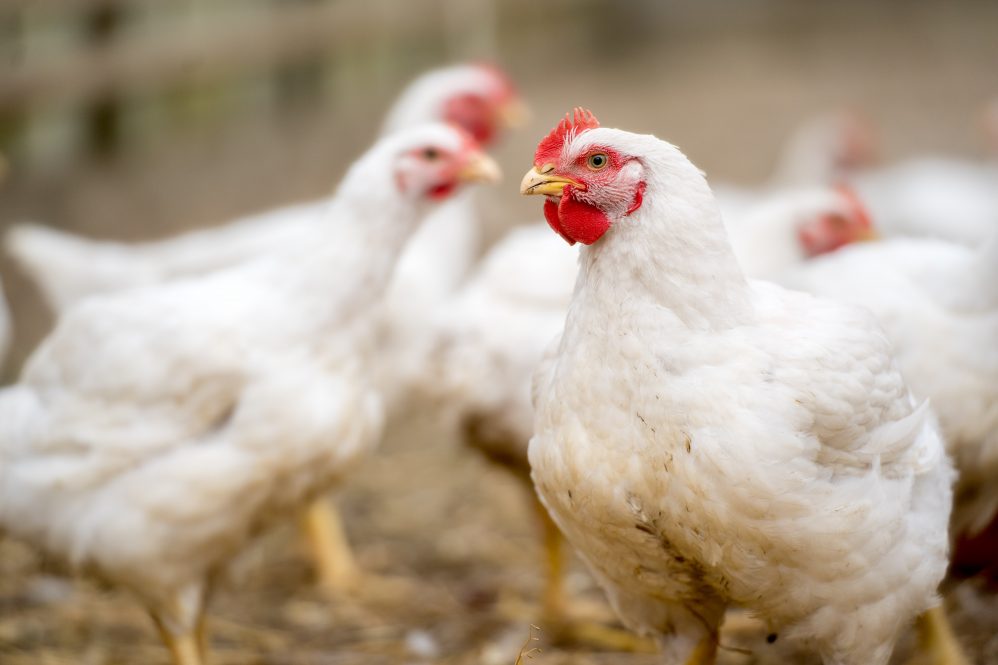In 2020, UConn researcher Kumar Venkitanarayanan, associate dean of research and graduate education in the College of Agriculture, Health and Natural Resources, received a $10 million award from the U.S. Department of Agriculture National Institute of Food and Agriculture (USDA-NIFA) to lead a project studying sustainable poultry production with an eye to chicken, human, and environmental health.
 “In light of the restriction of antibiotics in poultry production, we need to ensure the sustainability of the broiler industry,” Venkitanarayanan says. “Based on this principle, we are targeting the three major components of the poultry sector [chicken, human, and environmental health] to determine how we can improve broiler production without antibiotics and with the use of safe and environmentally friendly approaches.”
“In light of the restriction of antibiotics in poultry production, we need to ensure the sustainability of the broiler industry,” Venkitanarayanan says. “Based on this principle, we are targeting the three major components of the poultry sector [chicken, human, and environmental health] to determine how we can improve broiler production without antibiotics and with the use of safe and environmentally friendly approaches.”
The group, which includes researchers from multiple institutions, has already made significant progress on each of these objectives.
Chicken Health
The first objective within the chicken health component of the grant is preventing infection from two major diseases of concern for poultry farmers: a bacterial disease called necrotic enteritis and a parasitic disease called coccidiosis.
A group of researchers at the USDA have identified a vaccine candidate for coccidiosis, which is one of the costliest diseases in the poultry industry.
Farmers have used live or attenuated versions of the parasite that causes coccidiosis as a vaccine. However, the rise of drug-resistant parasites, their genetic evolution, and the cost of this type of vaccine meant it is time to look for new solutions.
This group published their findings showing this new vaccine candidate effectively protected young broiler chickens from infection in Poultry Science.
Researchers from the USDA have also been working on using beneficial bacteria to combat necrotic enteritis infection.
Necrotic enteritis occurs when there is a detrimental change in the microflora in chickens’ gastrointestinal track. Hence, the researchers wanted to find new ways to protect the chickens’ gastrointestinal health using probiotic bacteria and naturally occurring plant compounds.
Increasing global demand for meat necessitates identification of novel feed ingredients to improve growth, performance, and enhance the sustainability of broiler production. The researchers at UConn in collaboration with USDA-ARS and other institutions are identifying feed ingredients like insects and meal worms as proteins sources for chickens. Using these feed ingredients, investigators are comparing the chickens’ growth rate and gut health, and amino acid profile with the new supplements versus regular feed.
“This is critical because we all know our natural resources are getting reduced because of climate change, drought, and other environmental conditions,” Venkitanarayanan says. “So, our objective here is to identify alternative feed ingredients that can be incorporated into the poultry diet.”
In another study, Mary Anne Amalaradjou, associate professor of animal science, published a study demonstrating the efficacy of spraying chicken eggs with a probiotic bacteria before hatching on improving chicken growth rates and health.
The final element focused on chicken health is improving bird welfare in hot climates. In broiler production, chickens are densely packed into a small space. This causes heat stress and a buildup of ammonia from feces, which is a threat to birds’ and human workers’ health. Researchers from the University of Arkansas are looking at using naturally derived phytochemicals to condition the birds to better handle heat stress. Similarly, researchers from the University of Georgia are developing optimal circulation fan systems to control moisture and enhance air quality and litter quality in broiler houses.
Human Health
The human health initiatives in this grant focus on reducing food borne pathogens, like Salmonella and Campylobacter in poultry meat. These two bacteria are responsible for approximately 70% of all food-borne illness in humans.
Venkitanarayanan and his colleagues at UConn, Abhinav Upadhyay from the Department of Animal Science, Yangchao Luo from the Department of Nutritional Sciences, and Indu Upadhyaya from UConn Extension are leading the research on this aspect.
“There is a great interest in reducing the colonization of these two foodborne pathogens in poultry,” Venkitanarayanan says.
The group is using two molecules derived from cinnamon oil and coconut oil as poultry feed or water additives. The goal is to stop bacterial colonization in the chickens’ guts so that these bacteria cannot even reach the human consumer.
“We want to make sure broiler production is sustainable in the coming years even when antibiotics are restricted,” Venkitanarayanan says.
A second aspect of human health addressed in this grant deals with controlling antibiotic resistant bacteria in poultry meat. With food animals, including poultry being recognized as a source of antibiotic resistant bacteria, meat represents a potential vehicle of these microorganisms. Specifically, researchers have been monitoring the various antibiotic resistant bacteria in poultry and the production environment, including feed, water and litter and genetically characterizing them and tracking their source. On the other hand, researchers led by Venkitanarayanan are targeting to control the process of horizontal gene transfer through which bacteria spread antibiotic-resistant genes to each other in poultry production environment, making the entire colony resistant to existing antibiotics.
Environmental Health and Outreach
A group of researchers at North Carolina State University are looking at ways to recycle poultry litter into nitrogen- and phosphorous-enriched carbons which can be used to generate energy.
“Poultry litter is a major waste product from the poultry industry and there’s a huge environmental burden in disposing it,” Venkitanarayanan says.
Another group of researchers are investigating the socioeconomic and environmental impact of the whole grant project. The results of this research will be released following the conclusion of the project in 2026.
Educational specialists are also developing curricula for college-level courses on sustainable poultry production based on the grant’s work. These courses will be offered to undergraduate and graduate students at UConn in 2025.
The researchers are also regularly holding symposia and workshops with stakeholders including farmers, industry, and regulatory agencies to share the knowledge they have gained so far.
“This work is critically important from a One Health perspective, which recognizes the connection between the health of people, animals, and our environment,” says Venkitanarayanan. “CAHNR is uniquely positioned to lead in this type of interdisciplinary research, which continues to grow in importance for our society.”
Institutions involved in the project besides UConn are the University of Georgia, the University of Arkansas, the University of Mississippi, Prairie View Agricultural and Mechanical University, Iowa state University, the University of Minnesota, Pennsylvania State University, the University of Maryland, the USDA Agricultural Service of Maryland, North Carolina State University, North Carolina Agricultural and Technical State University, and Appalachian State University.
This work relates to CAHNR’s Strategic Vision area focused on Ensuring a Vibrant and Sustainable Agricultural Industry and Food Supply and Enhancing Health and Well-Being Locally, Nationally, and Globally.
Follow UConn CAHNR on social media



